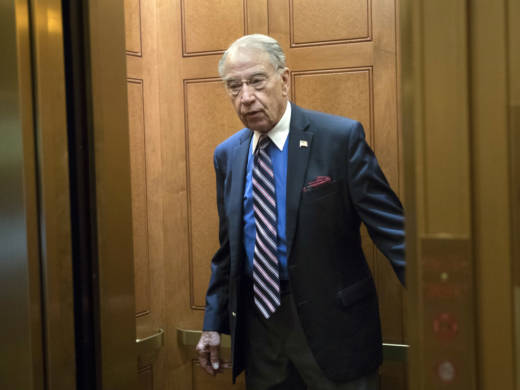A third proposal, by Sens. Chris Coons, D-Delaware, and John McCain, R-Arizona, would have created a path to citizenship for the Dreamers and did not include funds for Trump's border wall. That bill failed by 52-47. Both Feinstein and Harris voted for the legislation.
It is unclear whether those currently protected under DACA will immediately lose legal protections if the White House repeals the program as planned on March 5. Court orders by a pair of federal judges in New York and California have blocked the administration's plans to end the program, meaning the government is required to continue processing renewal requests from people already enrolled.
Senators Frustrated
The veto threat and other White House intervention frustrated Democrats and those Republicans who helped craft the bipartisan bill. Sen. Lindsey Graham, R-S.C., expressed irritation that the White House was relying heavily on hard-line immigration advisers.
"You've got the most extreme characters in town running the show," Graham told reporters. "What do you expect?"
The GOP-written Grassley bill would have allowed 1.8 million immigrants a chance to apply for citizenship. In exchange, the bill scaled back current legal immigration by ending the visa lottery system and cutting family-based immigration policies, which the president and many conservatives refer to as "chain migration."
In a statement Wednesday, Trump said he would reject any bill that did not meet his four pillars: "A lasting solution on DACA, ending chain migration, cancelling the visa lottery, and securing the border through building the wall and closing legal loopholes."
"I am asking all senators, in both parties, to support the Grassley bill and to oppose any legislation that fails to fulfill these four pillars," Trump said in a statement. "That includes opposing any short-term 'Band-Aid' approach."
Tensions were high as senators began to rally around Trump's demands on Wednesday. A visibly frustrated Grassley vented to reporters that Democrats needed to drop their opposition to the family-related portions of the bill and embrace the only offer Trump has embraced.
"The Democrats have been pleading for months and months and months for justice on this," Grassley said. "Now you've got a compassionate president who has gone way beyond what they ever thought he would do. Why would they turn it down?"
Copyright 2018 NPR. To see more, visit http://www.npr.org/.
9(MDAxOTAwOTE4MDEyMTkxMDAzNjczZDljZA004))

9(MDAxOTAwOTE4MDEyMTkxMDAzNjczZDljZA004))
